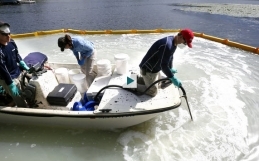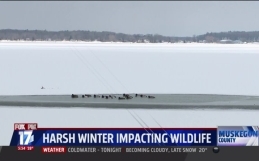Lake Michigan water level at record low
By Marc Thompson
GRAND HAVEN, Mich. (WOOD) – The water level average on Lake Michigan in January reached a record low — and it’s not expected to rebound in the coming months.
Officials with the US Army Corps of Engineers and Grand Valley State University’s Annis Institute say water levels have trended down for years now, but have never been this low. And the impact is far-reaching, affecting everything from shipping to recreation along the lake.
In January, the USACE recorded the lake level at 576.02 feet — the lowest average level recorded in Lakes Michigan and Huron since 1918.
Many of the harbors between St. Joseph and Ludington are commercial, serving ships hauling vital commodities such as coal that helps power communities like Grand Haven, Spring Lake and Ferrysburg.
“Low water levels are going to impact the shipping on the Great Lakes,” said civil engineer Christopher Schropp. “Ships can’t load to their full capacity, so they’re going to have light loads, which will in turn create higher pricing for coal, aggregate, sand, whatever commodities that are being shipped.”
Those higher costs may be passed on to consumers.
Recreation is going to be affected, too, according to Schropp.
“Sport fishing and recreational boating are going to be having problems getting their boats in the water at local DNR docks,” said Schropp.
Dr. Alan Steinman has been studying Great Lakes water levels for years at GVSU’s Annis Water Resource Institute. He said the low water level will affect local ecosystems.
“The coastal wetlands are potentially impacted,” said Steinman. “These are critical habitats in the Great Lakes. It’s where we have a lot of fish, wildlife, spawning, reproduction growth.”
He and the USACE says below-average snowfall last winter, combined with a hot dry summer, contributed to more evaporation and the record low levels. Lakes Michigan and Huron rose only 4 inches in 2012 compared to an average seasonal rise of 12 inches.
“Less navigation, less recreational boat traffic,” said Steinman. “For the fishers in the area, it’s going to be less commerce associated with the bait and tackle shops. It has a cascading effect. And this multiplier effect can be profound in our part along the coast here.”
Lake Michigan water levels have been below average for 14 years — the longest such stretch on record — and continue to trend down. Opinions vary regarding if and when water levels will rise again.
Story Courtesy of Wood TV




